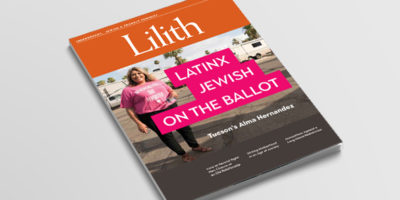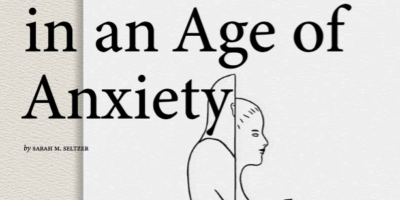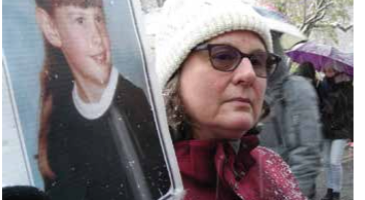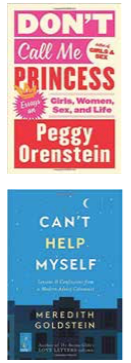
Gender & Vulnerability
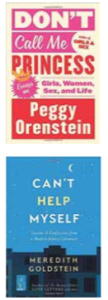 If you are unfamiliar with the work of Peggy Orenstein, you should change that as soon as possible. Her book Cinderella Ate My Daughter should be given out to parents of self-identifying (let’s be real here) girls. She is contemplative, bright and eminently approachable as a writer: her style is accessible and inviting, encouraging even those who are reluctant to call themselves “feminists” to get aboard her train of thought and keep on riding after the book has closed.
If you are unfamiliar with the work of Peggy Orenstein, you should change that as soon as possible. Her book Cinderella Ate My Daughter should be given out to parents of self-identifying (let’s be real here) girls. She is contemplative, bright and eminently approachable as a writer: her style is accessible and inviting, encouraging even those who are reluctant to call themselves “feminists” to get aboard her train of thought and keep on riding after the book has closed.
Don’t Call Me Princess: Essays On Girls, Women, Sex and Life by Peggy Orenstein (Harper Collins, $16.99) offers new-to-Orenstein readers a chance to sample the author’s strengths in a variety of essay topics. It is a cocktail-hour-style buffet of her work, as opposed to a full sit-down meal. Part One, entitled “Starlets, Scientists, Artists, Activists & Other Noteworthy Women” is, like the other sections, sprinkled with autobiographical introductions to each piece, so that the reader can get a sense of what was in Orenstein’s mind as she put pen to paper.
These small introductions are illuminating, and inextricably marry the personal (for example, how she went through multiple rounds of IVF, including with a donor egg, before conceiving “naturally”) with the political subjects of her essays. Including small tidbits like these is strategic: she is saying that no one is writing from a clean slate, and that her personal perspective informs her writing both in her choice of subjects and in the ways she approaches them. Knowing that Orenstein worked at Ms. Magazine, for example, gives her undeniable credibility as well as personal investment in describing its demise. Additionally, background on how Orenstein’s intent in writing a piece changed over the course of the reportage is both interesting and a window into the mind of a thoughtful observer.
Other sections, like “Not Your Mama’s Motherhood” on parenting and “Body Language” dealing with women’s bodies and health related issues, seem to be expansions on these essay-starting autobiographical notes. More first-person oriented, they are less think-piece-ish and more conversational; in many ways the short essay, “What Makes a Woman a Woman?” was particularly thought-provoking as a personal narrative about which body parts define a sense of self as female.
But overall, Don’t Call Me Princess is perhaps too expansive a buffet, especially considering that the sit-down meals of Orenstein’s individual books are so delicious. It has a slightly thrown-together feel to it that, while lending itself to reading in short spurts, doesn’t carry the power of her other books.
In contrast, Can’t Help Myself: Lessons And Confessions From A Modern Advice Columnist by Meredith Goldstein (Grand Central Publishing, $24.98) is all-casual all the time. It is divided up into micro narratives by advice topics, while the macro-narrative is the extremely personal status of Goldstein herself, which ties everything up well and unexpectedly. This is an unassuming book by someone who reads as an unassuming person: Goldstein, the author of The Boston Globe’s “Love Letters” column, readily admits that, as a single person, she has big gaps in her knowledge of what would make her own romantic heart beat in a permanent relationship.
Goldstein, possibly in a strategic move, opens up her book with the tale of the demise of her own long-term relationship with a coworker. In doing so, she immediately presents herself not as omniscient giver of romantic advice, but, instead, as vulnerable, likeable and humble. The gambit works. The reader finds herself more interested than she might expect to have been in the vagaries of Goldstein’s personal life. It’s perhaps particularly interesting because the advice that she gives, whether coming from personal experience or not, is really quite insightful and spot-on. For example, to divorced parents: “When kids are involved, exes need to maintain a civil relationship, which is very different than a full-blown, platonic friendship. You should be cordial, loving co-parents— not part-time life partners.”
As she weaves her personal story into the spaces between the letters from the lovelorn she receives, Goldstein manages to pull off a fascinating feat of learning from the very people asking her questions. In confiding her own difficulties with her ailing mother, her maybe-too close coworker and her strong sister, she wins the reader over to feel that she is a friend. And who among us wouldn’t rather take advice from a well-intentioned friend? By the book’s end, we are rooting for her to help herself, and applauding all the help she has given to dozens of others.

